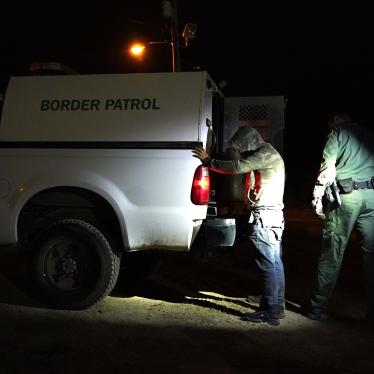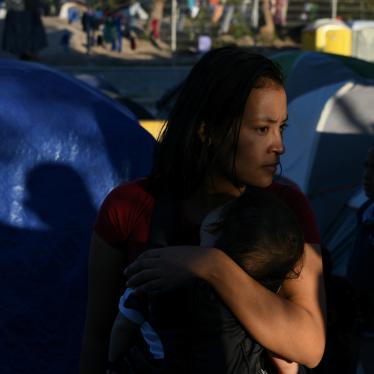The way the United States handles the arrival of migrants at the southern border is in dire need of reform, as border control agents themselves have told me.
Recently, eight former U.S. Customs and Border Protection agents spoke with me about the identity crisis facing their agency. Together they had 35 years of experience, working in locations across the southern border and held titles ranging from patrol agent to chief. Some agreed to be identified, while others spoke on condition of anonymity to preserve their current jobs or relationships.
Those applying to work for Border Patrol are told they will "protect our country against illegal activity, narcotics, human trafficking and terrorism." Yet there is no credible evidence of terrorists entering through the southern border, according to the U.S. State Department, and about 70 percent of firearms used in crimes in Mexico over the last several years originated in the United States, the world's leading exporter of conventional weapons. The page doesn't mention migrants or asylum.
"Most people get into law enforcement in general for good, noble reasons," a former Border Patrol Tactical Unit agent of more than 18 years told me. "They want to catch the bad guys. They want to be the Batman. Then at some point in their career, the reality hits them. What am I really doing out here?"
He said that agents spend much of their time apprehending and processing migrants, the majority of whom are seeking asylum, fleeing environmental disaster, returning to family or homes in the United States, or searching for job opportunities.
"This isn't a law enforcement job," former Border Patrol Chief Victor Manjarrez Jr told me. "It should be FEMA [Federal Emergency Management Agency] that's out there."
Former Border Patrol agent Jen Budd called it "using a law enforcement tool to hammer away at a humanitarian nail."
In a tense meeting agents had with Department of Homeland Security Secretary Alejandro Mayorkas in January, the secretary acknowledged that apprehending and processing migrants is not what agents signed up to do.
The result is that many agents re-cast the people they encounter at the border as law enforcement "problems."
Francisco Cantú, a Border Patrol agent from 2008-12, told me that Border Patrol "has a culture of cruelty" and "a culture of dehumanizing" border crossers.
"Certain agents care for and bring compassion to their work, but it is not at all by virtue of the institution or their training," Cantú said. "The moment that I showed up in the field, within a couple of days, I had seen senior agents instructing and teaching junior agents to crush food, leave abandoned property out in the desert."
Agents said they are trained to criminalize migrants and to use disparaging language to refer to them, such as "tonk" (or "tonc"), a term used by agents for "the sound heard when a [racist slur for a person perceived as being an irregular immigrant from Mexico] is hit over the head with a flashlight."
Other agents defended the use of disparaging language as "boys talking boy shit" or else used such language themselves. The use of "aliens" and "illegals" was commonplace. A former Border Patrol agent who retired after 18 years referred to Mexican migrant children as "f----- from birth" and "river rat[s]," adding that migrant children are "not the same" as children from the U.S. side of the border.
"We were taught that they were all criminals and that their children were soon to be criminals," Budd said. "They would say they're all here to live off of welfare or else that they're coming to take our jobs."
Experts have linked dehumanization to violence. Border Patrol agents have in recent years killed dozens of people and turned away asylum seekers exercising their legal right to seek protection, knowingly returning them to danger. Allegations abound of other serious abuses, including physical assault and sexual abuse of migrants and harassment and surveillance of attorneys and human rights workers.
Border crossers aren't the only ones who suffer: The moral injury agents incur as the result of this behavior contributes to Border Patrol's high rate of suicide, agents told me.
The border security industry (U.S. agencies and public-private contracts) is worth hundreds of billions of dollars, and U.S. President Joe Biden received more than $5 million in campaign donations from the industry. Trump received a much smaller sum, showing that border security companies were hedging their bets. Democratic and Republican lawmakers, including President Biden, have done very little to end abusive border policies. Beyond the enabling factors of dehumanization and campaign dollars, being tough at the border is also perceived by many as a political win, even when toughness is rarely, if ever, what's required.
Border Patrol gets "all the problems dumped on them that nobody else wants to take care of, and then when they act on them, they're the bad guys," a former chief, who retired after 30 years, told me. "Politicians have no desire to fix the problem because the immigration system itself and the immigration problem is just the magic pill that they need to energize a base."
Without serious congressional oversight, the agency has unsurprisingly failed to police itself.
Manjarrez, who retired after more than 20 years, said agents sometimes fail to turn one another in when they suspect wrongdoing.
Another former agent said that agents get away with misconduct because investigations are anemic and agents are not held accountable, leaving agents who may have otherwise reported their coworkers worried about retaliation.
"When you know an agent is doing something illegal, it's not worth it to come forward," he said. "Why risk it?"
One clear way to reduce misconduct is to remove Border Patrol from the humanitarian task of processing migrants, including asylum seekers. If they are free to focus on their law enforcement responsibilities, dangerous dehumanization practices will be partially neutralized.
The Biden administration should increase appropriately trained personnel—asylum officers, doctors, child-care specialists, mental health services professionals and other first responders—at the border using funds currently allocated toward immigration enforcement and detention. Beyond initial screening of migrants, the United States should transfer humanitarian reception, including migrant processing and asylum functions, from Customs and Border Protection to a separate government agency, such as FEMA, or groups with trauma-informed training and whose mission is to perform humanitarian services.
Lawmakers should act decisively, for the benefit of agents and border crossers, to implement humane and rights-respecting border policies.










